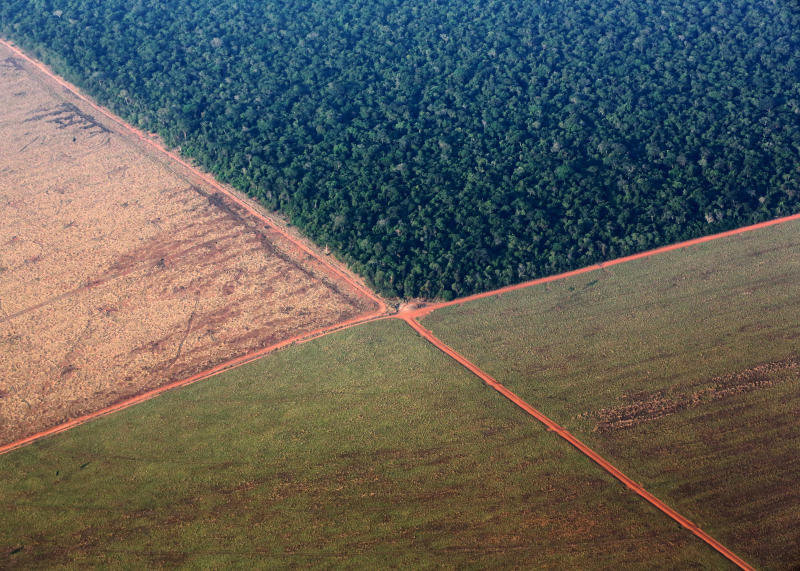UN report reveals scale of crisis facing nature, but says there's hope
Sign up now: Get ST's newsletters delivered to your inbox

The Amazon rain forest, bordered by deforested land prepared for the planting of soybeans, in this aerial photo taken over Mato Grosso state in western Brazil.
PHOTO: REUTERS
SINGAPORE - A global assessment of life on earth says nature is declining at an unprecedented rate and the pace of extinctions of plants and animals is accelerating, putting at risk economies and the well-being of all people.
Up to a million species are threatened with extinction and mankind needs to make urgent and sweeping changes to economies and the way goods are produced and consumed to stem the rapid decline of nature, says the report from the Intergovernmental Science-Policy Platform on Biodiversity and Ecosystem Services (IPBES) released in Paris on Monday (May 6).
The 1,800-page UN report is the world's most comprehensive review on the health of nature. It took three years to compile and involved 145 experts from 50 countries. The authors and representatives from more than 130 nations met in Paris last week to finalise a much shorter summary for policymakers.
The assessment is a report card on the way humans have reshaped the planet in a matter of decades to fuel economic growth and feed billions more people.
The conclusions are alarming and show that mankind is stripping the planet of its resources at an unsustainable rate and causing severe damage via a combination of destruction of the land and seas, climate change, pollution and other pressures.
"The health of ecosystems on which we and all other species depend is deteriorating more rapidly than ever. We are eroding the very foundations of our economies, livelihoods, food security, health and quality of life worldwide," said IPBES chair, Sir Robert Watson, in a statement.
The authors, who reviewed about 15,000 scientific and government sources, found that the rate of global change in nature during the past 50 years is unprecedented in human history. In that time, the global economy has grown nearly fourfold and global trade tenfold.
It shows that as nations grow their economies, they are consuming more, wasting more, causing more pollution and damaging the very life-supporting ecosystems that have nurtured human societies. Nature provides the food we eat, from the plants that we use to grow crops, the soils in which they grow, to water from rivers and clean air filtered by forests.
Coral reefs, for instance, are home to a quarter of all marine species and fisheries on which hundreds of millions of people depend. Yet climate change is warming the oceans and damaging reefs, while overfishing is decimating fish stocks.
Vast tracts of tropical rainforests have been cleared for agriculture, such as soy, rubber, oil palm and pulpwood plantations. Yet rainforests contain some of the richest concentrations of species on the planet, are key stores for water that feed rivers and clouds, and are a source of medicines such as cancer drugs for millions of people.
Forests also help soak up some of mankind's planet-warning carbon dioxide emissions, so cutting them down only speeds up climate change.
The report says 75 per cent of the land environment and 66 per cent of the marine environment have been significantly altered by human actions.
It says that since 1970, there has been a 300 per cent increase in food crop production yet land degradation has reduced productivity on 23 per cent of the global land surface.
Three-quarters of global food crops, including fruits and vegetables, rely on pollination. However, the decline in pollinators such as bees and beetles threatens annual global crop production worth up to US$577 billion (S$785 billion).
Pollution is also pushing nature to the brink. Plastic pollution has increased tenfold since 1980, the report says, while between 300 million and 400 million tonnes of heavy metals, solvents, toxic sludge and other industrial wastes are dumped annually into the world's waters.
"The report also tells us that it is not too late to make a difference, but only if we start now at every level from local to global," Prof Watson said.
Adding to the urgency, nearly 600 conservationists from 50 nations have signed a letter calling on world leaders to take urgent steps to save nature.
One of them, Mr Numa Bertola, a researcher at the Singapore ETH Centre who signed in his personal capacity, said: "Personally, I am deeply concerned about the current loss of the world biodiversity as humans benefit significantly from it."
He added: "I feel that there is a lack of awareness of the impact of big cities on biodiversity outside their boundaries. I hope this report will encourage governments around the world to take bolder steps in protecting our planet, and raise awareness of the far-reaching impacts of our lifestyle."
The letter said there was still time to protect what is left and to start restoring nature.
"But to do that, we must radically change the way we live, including how we use energy to power our societies, grow our food, and manage our waste," the signatories say.
For that to happen, decisive and ambitious action is needed from world leaders, they add.

Additional reporting by Vanessa Liu


